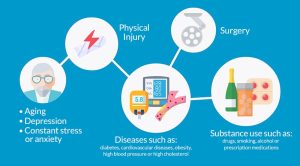Male Sexuality and Emotional Needs

ED doctor from Seattle explains male sexuality. What women and men need to know about men’s desire and emotional needs.
Long-held stereotypes contend that men are always interested in sex, happiest being the pursuer, and focused solely on the physical. A new book disagrees. I have been speaking about this for years based on years of experience and review of the sexual literature. A book has recently been published about this, written by a Ph.D. sex therapist and researcher.
What do men want?
Long-held stereotypes contend they’re always interested in sex; happiest being the pursuer; focused on the physical rather than the emotional connection. If we discuss male sexuality at all, we tend to focus on the darker, toxic side – the entitlement and aggression increasingly exposed by the #MeToo movement. This only furthers the myths and stereotypes.
A new book “Not Always in the Mood: The New Science of Men, Sex, and Relationships” by Sarah Hunter Murray, debunks several commonly held myths about male sexuality. It explores how a man’s desire fluctuates, why most men are eager to please their partner, and how sex – or the lack of it – affects men emotionally.
Why do we hold so many myths about male sexuality?
The image we have of men is being reinforced everywhere. Movies and songs portray men as animals who always want sex. Men talk about other men that way and women talk about men that way. The stories that came out of the #MeToo movement about male sexuality being selfish and toxic reinforced this. And we have gotten complacent with the stereotype. Stereotypes have some elements of truth but applied broadly are not very helpful. With the latest assault on men, “Toxic Masculinity”, these stereotypes are being pushed further. Most have never experienced toxic masculinity, yet the “experts” say it is all around us.
When you consider that men have not always been encouraged to express feelings, it is no wonder that little attention has been paid to what men really want and need from their partners. Most discussions about sexuality center around women’s needs and desires and men’s lack of understanding of this.
I believe the key to this question is understanding that BOTH men and women need intimacy for a relationship to be successful. There is a big difference in how the sexes meet intimacy needs.
Is sex more emotional for men than people realize?
Absolutely. We talk about men’s sexual desire being largely triggered by physical appearance and things like lingerie, low-cut shirts, and high hemlines. Of course, this can be true. If not, why would women bother to dress provocatively? But what we miss is that the emotional piece often matters more.
What drives a man’s sexual desire is feeling connected, wanting to be close to his partner – and not just in a physical way. The emotion is: “I want to experience her. I want to be close. I want to feel love.” I’ve heard men say that they’ve felt desire when they sat on the couch and rubbed their partner’s feet, shared a bottle of wine, or went camping. There was a shared experience.
Deep communication came up as well. Men said they felt desire when they felt heard by their partner when they were on the same page. They would say things like: “I really felt that my partner saw me, that she got me at that moment.”
What emotional needs does sex meet for men?
During sex, men can be loving. They can be manly. But they can also be vulnerable. They can let their walls down. They don’t have to be strong or dominant. They don’t have to lead the meeting. It’s a completely vulnerable experience to be naked and let someone see and hear you, to let someone completely love you. The stress of work, the need to be that perfect idea of what society says men must be – the dominant powerhouse in control – can just fade away.
What happens when the emotional connection in a relationship is missing?
His sexual desire tends to decrease. We hold this idea that men are always interested in sex. But men do say no when they aren’t feeling that emotional connection. Sometimes the problem is acute: They haven’t resolved a fight. Sometimes it’s grown over the course of the relationship – they feel increasingly disconnected over time.
When sex dies down men often withdraw. Men can become depressed. One of the problems is that when a man feels disconnected from a partner, sex might be the way he tries to get things back on track. Because sex represents an emotional connection for him, he may still try to initiate it. But all the woman thinks is: “You just care about yourself. All you think about is sex.” Women don’t understand how he may really be feeling.
Men want to feel wanted. They want to feel that their partner is as excited about the sexual encounter as they are, that she feels her sexual needs and pleasure are of utmost importance to him. Men will say that if she is not mentally engaged, he’s not interested.
How harmful is this to the relationship?
Very. When a man wants to have sex and his partner agrees but is not mentally engaged, he feels he should hurry. It leads to bad sex that neither one is excited about having. And it leads to less openness to having sex. He retreats emotionally. He misses out on the intimacy, vulnerability, and ability to strip down and be seen for who he is – things he may only get from sex.
Women may not understand this becausethey get so many of their emotional needs met elsewhere,like intimate talks with their friends. The situation spirals. If you feel that your emotional needs aren’t being met, that you are getting rejected, it pulls you away from the marriage. Men do not have the range of emotional support resources that women do. They do not talk about feelings and emotions at work, the gym, or watching the ball game. Men get their intimacy first and foremost from their spouse, and to a lesser extent their children or siblings. If the spouse retreats, men have little recourse.
How do men experience sexual rejection?
What drives a man’s sexual desire is feeling connected, wanting to be close to his partner – and not just in a physical way.
When men say they initiate sex not just to experience physical pleasure but for a moment of emotional connection, then rejection feels personal. They say: “I feel she doesn’t want to be close, that she doesn’t like me.” They talk about how this makes them doubt themselves and doubt their relationship. She said no to sex, but she’s really saying no to me.
Despite the myth that men are sexually selfish, most love to please their partner.
There’s plenty of research to suggest that if a woman has an orgasm, a man takes it as a boost to his masculinity. Research also suggests something else may be going on as well: Her pleasure reflects the shared connection they have. It shows that she is feeling intimate and close. They are on the same page, enjoying sex together. There is no more powerful aphrodisiac for a man than a partner who is as engaged and excited about sex as they are.
BUILDING INTIMACY
How can you connect more intimately with your male partner?
Don’t make assumptions.When he initiates sex, don’t presume he’s only looking for a physical connection or release. He may be looking to feel closer to you. If you’re not interested, consider connecting with him in a different way. Share a meal or a glass of wine. Make time for a favorite activity you both enjoy.
Let him say no sometimes.Try not to take it personally. There are numerous reasons men may not be in the mood for sex – stress or health issues, being tired, normal fluctuations in interest – that have nothing to do with their desire for their partner.
Initiate.Tell him he looks handsome. Give him a kiss out of the blue. Research shows men – just like women – want to feel sexually desired by receiving compliments, being on the receiving end of flirtation or seduction. Men get tired of always being the pursuer. Everyone knows the woman is the gatekeeper when it comes to sex. This may be one of the larger disconnects when a couple has been together for several/many years. If a woman is going through hormonal changes, such as menopause, the libido can decrease significantly. 70% of women will have a significant drop in libido by age 50. No libido means little or no interest in sex. Therefore, no reason to entice your partner. The best way to push a partner away is to show little interest in intimacy.
Everything does not need to be perfect. Stop worrying about how you look. Men compliment their spouses and tell them how desirable they are, even in later years, yet the usual response from the spouse is to discount that. Your makeup or hair is often of little consequence. Your interest and desire are. Men will tell you that the woman who grabs their attention is not the most fabulous, pretty, voluptuous, or best dressed. The woman who engages a man, looks him in the eye, flirts a little, laughs, and just is relaxed and fun wins out every time. In other words, they are “sexy” without trying to be sexy. A man will prefer the average looking passionate woman to the ice-queen every time.
Reject sex kindly.Initiating sex is a vulnerable act for men and he can take your rejection personally. If there is a reason you’re not in the mood – you’re tired or too busy – tell him. It will help reassure him. Suggest another time soon when you’d like to be intimate, and then follow through! Otherwise, it just becomes another rejection from a lack of interest.
Give him space to be vulnerable. Men often feel pressure to be confident, in control, always up for sex. If he shows you his softer side – by admitting he hasn’t been as interested in sex recently or that he feels emotionally disconnected – recognize that vulnerability takes courage. Listen. Don’t judge. Appreciate the risk it took for him to share.
Consider why you do not have much interest in sex. If 70% of women have a significant drop in libido by age 50, you would think more attention would be paid to this by primary care physicians and their patients. Why do women just accept this? One reason is no one asks! If you are 50, and not interested in sex, can you really say the next 35 years will just be fine without? Do you not want sex, or do you just not think about it? Talk to women who have started a new relationship in their later years. Sex is suddenly “great” and often better than they ever experienced. And these relationships are strong. Why? The idea that women cannot enjoy robust sex into their 7thand 8th decades is ludicrous. See a physician that understands hormone replacement therapy (HRT). If a doctor tells you: “You are just getting old”, leave that office. Any physician that tells you this is poorly informed, lazy, or both.



